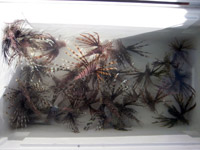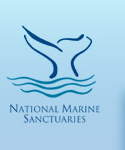More than 500 Lionfish Removed in Florida Keys Inaugural Lionfish Tournament
Sept. 15, 2010
Media Contact:
Karrie Carnes
305-809-4700 x236
Links:
Are lionfish really a threat to the Florida Keys?
Lionfish Sightings Distribution, U.S. Geological Survey
Florida Keys National Marine Sanctuary Lionfish Removal Permits
More than 100 divers collected 534 Indo-Pacific red lionfish during the first tournament dedicated to reducing the population of the invasive species in the Florida Keys National Marine Sanctuary.
The September 11 tournament in Key Largo, organized by Reef Environmental Education Foundation (REEF) and the Sanctuary, is the first of three Keys-based lionfish roundups. The event attracted 27 teams which competed for cash and prizes to collect the most, largest and smallest lionfish.
The winning team captured 111 lionfish during the single day event. The largest lionfish caught measured in at just under 11 inches, and the smallest at less than two inches. Lionfish can grow to lengths of over 18 inches in western Atlantic waters where they are not native.
“The sanctuary is thrilled by the response from the dive community,” said Sanctuary Superintendent Sean Morton. “The volume of fish caught during this single day event demonstrates that dedicated diver removal efforts can be effective at helping keep this invasive at bay.”
Team “RAAR Talent,” hailing from the upper Keys and Washington DC, earned the $1,000 grand prize for most lionfish. The “Lion Killers” of Islamorada and Marathon netted the largest lionfish, along with $500. And with the capture of the smallest lionfish, team “Full Circle from Key Dives” also caught themselves $500.
“The community participation in this event surpassed even our most generous expectations”, said REEF Director of Operations, Lad Akins. “Everyone came together for a great event, including sponsors, volunteers, organizers, and of course, the lionfish hunters. Even those who brought in a single fish contributed to the protection of our native marine life and deserve our thanks.”
Divers and snorkelers interested in participating for the remaining 2010 Keys lionfish tournaments may register online at www.reef.org.
The second lionfish derby will be held October 16 at Keys Fisheries Market and Marina in Marathon, FL. The third derby will be held November 13 at Hurricane Hole Marina, in Key West, FL. A $100 registration fee provides each team with a pair of puncture resistant gloves — important protection from lionfish spines — and two tickets to the tournament banquet.
Lionfish's growing populations off the southeast U.S., Bahamas and the Caribbean are impacting indigenous fish populations. Lionfish have no known predators in their invaded range and consume commercially and ecologically important fish species.
For complete results and derby information go to http://www.REEF.org/lionfish.



